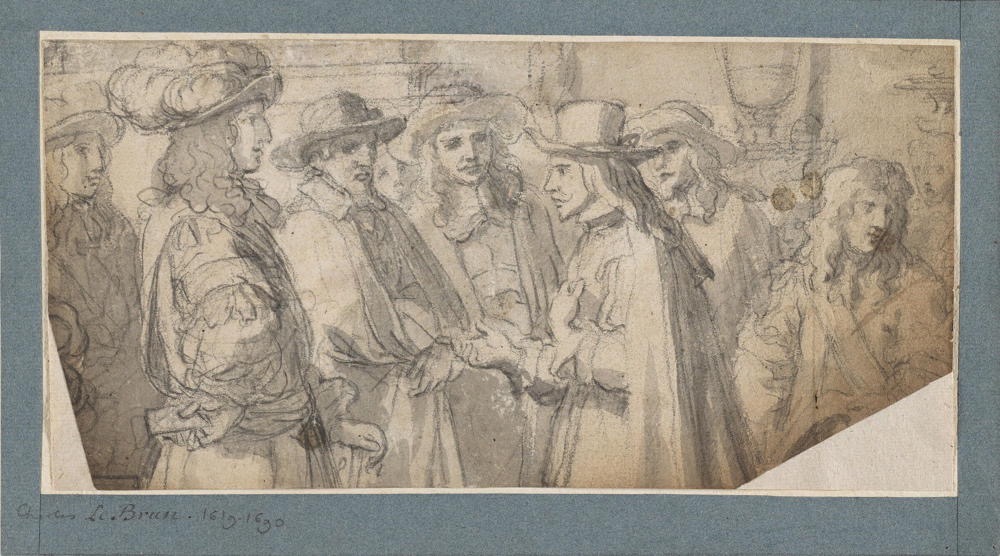Credentials

Charles Le Brun: King Louis XIV Receiving Ambassadors from the Court of Spain (c. 1674)
" … just another form of playing the same game …"
No other place in this country was ever even half as formal as Washington, DC. Everybody there seems to carry Credentials, usually on a lanyard around their neck. Those without that lanyard seem mysterious. Perhaps they're visitors? Maybe one of the rare private sector employees? Most work for our government and interact with material deemed secret from somebody. Every lobby features a security checkpoint requiring ID to pass. Office suites require a magnetic card or an escort to enter. Further, business casual has yet to arrive and might never arrive. The men wear suits and ties, and the women wear equally formal attire. Casual Fridays were never observed. People engage exclusively in serious business, much of it mandated by Congress.
The Muse received her credentials after undergoing a thorough FBI background check. She was not hired as a department head. She controlled no budget. No employees reported to her. She was not a government employee but a contractor working for a company that provided thousands of employees assigned to support Department of Energy laboratories. She was hired to work on Permanent Assignment to the DC office of one of those labs. Further, she was assigned to support a Department of Energy program—and not one you've ever heard of. Still, none of her work would have been possible had she not first earned her FBI clearance.
Beyond the nearly ubiquitous ID packet, further levels of scrutiny were placed upon anybody living or working in DC. Many of our neighbors in Takoma Park were veterans of service in the Peace Corps. Former service serves as a prime credential and status. Many The Muse worked with on her program had advanced degrees. Some had two or three PhDs. The most prestigious vitaes listed diplomas from The Ivies, the top tier Ivy League institutions: Harvard, Yale, etc. It was common practice to exchange vitaes when first meeting someone. In my hometown, the most common introductory question was not usually about job title or alma mater but which family you hailed from.
I had no such credentials beyond a driver's license and a passport. Later, I acquired a Library of Congress Reader's Card. I had not taken any advanced degrees, let alone from an Ivy. Nor did I hold a prestigious position. I was unemployed, engaged as an invisible husband to someone working deep down in the belly of the Forestal Building, just across from the Smithsonian Castle. I attended a dinner party and was asked by another guest who I was "with." He had earlier introduced himself as the Chief Information Officer of the Central Intelligence Agency. I responded that I was with myself, that I'd come unattended. "No, no," he insisted, "You must work for somebody!" "Yes," I replied, "I work for myself." "Who signs your paycheck?" He tried one final gasp. "Nobody," I replied. He was incredulous as if I'd declared an impossibility.
I was a nobody when I was Exiled. The Muse received a new identity upon entering. I did not. I introduced myself as a writer and author of a minor best-seller, still writing but not presently publishing. I was shaving what few Credentials I had, but only to satisfy the local customs. One must present some sort of credential. I had never bought into the idea that an Ivy League education bestowed anything exceptional on anyone other than perhaps elevated self-esteem. I'd seen plenty of Ivy League-educated executives in my consulting practice perform just as poorly as they might presume someone with no more than an associate's degree from a disreputable community college would. There's a lot they don't teach at Ivys.
Still, the local custom stood and needed at least begrudging appreciation. I learned to appear suitably impressed when informed that I was in the presence of someone with an advanced Ivy degree. I could convincingly cheer when a neighbor reported that their daughter had been accepted at Georgetown or when another reported that they'd once served as Special Council to a Senate Investigating Committee. Most of the citations meant little to me, but I learned to treat the least of them with the utmost respect. That's what nobody's do. We learn to swallow what remains of our ego and encourage others to lift their bushel basket to show off their light without even considering engaging in the subtly proffered competition. Nobodys learn to let everyone else win those competitions in which they have no business engaging. I secretly felt superior for not needing to play that game, which was just another form of playing the same game but without Credentials.
©2024 by David A. Schmaltz - all rights reserved


